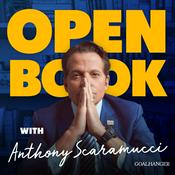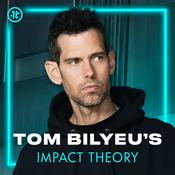154 episodes
- Send a text
Strange bedfellows keep shaping the future of intelligence. Neuroscientist Sean Manion joins Brian "Ponch" Rivera to start with a canceled consciousness conference tied to Epstein disclosures, then unravels the threads: cybernetics' origins in Wiener’s teleology and Macy meetings, Boyd’s OODA Loop as a cybernetic descendant, AI’s engineering dominance sidelining broader systems thinking, and Epstein/Brockman networks influencing cognitive science.
We critique LLM reliability ceilings, preprint floods lacking curation, von Neumann’s architectural warnings, Wiener’s governance cautions, and Church-era "limited hangout" echoes in today’s transparency gaps. The conversation pivots to resurgence: analog computing mimicking the brain’s digital-analog hybrid (glia’s role in timing and gradients), memory’s unreliability, LLMs as partners not prophets, and the power of small, interdisciplinary circles for real progress.
A must-listen for anyone navigating AI limits, knowledge politics, or Boyd’s framework in uncertain times. Tune in, subscribe, and share your biggest unanswered question in the reviews.
Links:
Is the staggeringly profitable business of scientific publishing bad for science?
John R. Boyd's Conceptual Spiral was originally titled No Way Out. In his own words:
“There is no way out unless we can eliminate the features just cited. Since we don’t know how to do this, we must continue the whirl of reorientation…”
A promotional message for Ember Health. Safe and effective IV ketamine care for individuals seeking relief from depression. Ember Health's evidence-based, partner-oriented, and patient-centered care model, boasting an 84% treatment success rate with 44% of patients reaching depression remission. It also mentions their extensive experience with over 40,000 infusions and treatment of more than 2,500 patients, including veterans, first responders, and individuals with anxiety and PTSD
John Boyd’s Conceptual Spiral was originally titled “No Way Out.” In his words:
“There is no way out unless we can eliminate the features just cited. Since we don’t know how to do this, we must continue the whirl of reorientation…”
Download a complete transcript of Conceptual Spiral for free by clicking here.
Stay connected with No Way Out and The Whirl Of ReOrientation
Follow Us onX: @NoWayOutcast
@PonchAGLX
@NoWayOutMoose
Subscribe to our Substack – The Whirl Of ReOrientation Long-form work on John Boyd, Orientation, and how to think and act inside the Guerrilla Information War.
Want to build your organization’s capacity for free and independent action?See how we help teams become more competitive, collaborative, and coordinated under pressure:
AGLX
AGLX Yo... - Send a text
Retired Marine Corps Colonel Alex Vohr joins No Way Out - The OODA Loop Podcast to unpack John Boyd’s authentic, non-linear OODA loop sketch from "The Essence of Winning and Losing." Drawing from his 25-year Marine career—including early adoption of maneuver warfare doctrine, leadership at the School of Advanced Warfighting (SAW), and combat operations—Vohr shares why the common four-step, speed-obsessed version misses Boyd’s core insight: Orientation is the schwerpunkt
Think speed wins battles and markets? Only if you’re oriented correctly—otherwise, you’re racing in the wrong direction. Hosts Mark "Moose" McGrath and Brian "Ponch" Rivera dive into how Orientation—shaped by genetics, culture, experience, and new information—drives observation, decisions, and action in uncertain, complex adaptive systems. They explore nested OODA loops in teams and organizations, harmonization for aligned vectors, planning as orientation-tuning under time pressure, relative tempo over blind speed, decision quality versus luck, and avoiding OODA loop fatigue from oversimplified myths.
Vohr discusses his new book, Speed Kills: Leveraging John Boyd's OODA Loop to Build Organizations That Win (featured on the
John R. Boyd's Conceptual Spiral was originally titled No Way Out. In his own words:
“There is no way out unless we can eliminate the features just cited. Since we don’t know how to do this, we must continue the whirl of reorientation…”
A promotional message for Ember Health. Safe and effective IV ketamine care for individuals seeking relief from depression. Ember Health's evidence-based, partner-oriented, and patient-centered care model, boasting an 84% treatment success rate with 44% of patients reaching depression remission. It also mentions their extensive experience with over 40,000 infusions and treatment of more than 2,500 patients, including veterans, first responders, and individuals with anxiety and PTSD
John Boyd’s Conceptual Spiral was originally titled “No Way Out.” In his words:
“There is no way out unless we can eliminate the features just cited. Since we don’t know how to do this, we must continue the whirl of reorientation…”
Download a complete transcript of Conceptual Spiral for free by clicking here.
Stay connected with No Way Out and The Whirl Of ReOrientation
Follow Us onX: @NoWayOutcast
@PonchAGLX
@NoWayOutMoose
Subscribe to our Substack – The Whirl Of ReOrientation Long-form work on John Boyd, Orientation, and how to think and act inside the Guerrilla Information War.
Want to build your organization’s capacity for free and independent action?See how we help teams become more competitive, collaborative, and coordinated under pressure:
AGLX
AGLX Yo... - Send a text
A Marine’s war doesn’t end when orders do. Matthew Ryba takes us from boot camp before 9/11 through Ramadi and Marja—lost friends, near misses, and a night spent in a fallen lieutenant’s rack that changed his trajectory—and into a lab where PTSD is measured, mapped, and, unexpectedly, met by horses. Along the way we confront hard truths: why the military’s alcohol culture magnifies risk, how drone warfare’s drive-to-work, bomb, drive-home rhythm fractures identity, and why so many veterans avoid therapies that demand retelling the worst day of their lives.
What makes this conversation different is the practicality. Matt breaks down the Man O’ War Project’s eight-week equine-assisted therapy: 90 minutes, once a week, outside the clinic walls. No trauma scripts. Just teams of veterans, skilled facilitators, and horses that mirror human arousal with astonishing sensitivity. The goals are simple—guide a horse at liberty onto a tarp, breathe when frustration rises, coordinate with peers—and the outcomes are powerful. fMRI data shows shifts in threat and reward circuits. Nearly half of participants no longer met PTSD criteria after completing the program. Dropout rates fell to 8.4 percent, a fraction of typical veteran care.
We also widen the lens. Moral injury in ambiguous wars, the way memory reshapes itself, and the role of camaraderie when the uniform comes off—all affect recovery.
John R. Boyd's Conceptual Spiral was originally titled No Way Out. In his own words:
“There is no way out unless we can eliminate the features just cited. Since we don’t know how to do this, we must continue the whirl of reorientation…”
A promotional message for Ember Health. Safe and effective IV ketamine care for individuals seeking relief from depression. Ember Health's evidence-based, partner-oriented, and patient-centered care model, boasting an 84% treatment success rate with 44% of patients reaching depression remission. It also mentions their extensive experience with over 40,000 infusions and treatment of more than 2,500 patients, including veterans, first responders, and individuals with anxiety and PTSD
John Boyd’s Conceptual Spiral was originally titled “No Way Out.” In his words:
“There is no way out unless we can eliminate the features just cited. Since we don’t know how to do this, we must continue the whirl of reorientation…”
Download a complete transcript of Conceptual Spiral for free by clicking here.
Stay connected with No Way Out and The Whirl Of ReOrientation
Follow Us onX: @NoWayOutcast
@PonchAGLX
@NoWayOutMoose
Subscribe to our Substack – The Whirl Of ReOrientation Long-form work on John Boyd, Orientation, and how to think and act inside the Guerrilla Information War.
Want to build your organization’s capacity for free and independent action?See how we help teams become more competitive, collaborative, and coordinated under pressure:
AGLX
AGLX Yo... Reclaiming Your OODA Loop: Counterintelligence & Narrative Control with Kit Perez
02/2/2026 | 1h 12 mins.Send us a text
Outrage is cheap. Orientation is priceless. We bring a counterintelligence lens to the daily firehose of headlines and hot takes, showing how narratives are built to hijack your attention, flood your emotions, and outsource your decisions. The pivot is simple and powerful: stop fixating on what was said and start asking why it was said, what feeling it tries to evoke, and what action it wants from you.
We walk through a practical debriefing method—collect the what from multiple angles, restore context, then probe how and why—so your judgments rest on ground instead of fog. Along the way, we unpack the subtle levers of influence: phrases like “everybody knows,” aesthetic edits that recast a subject, and the way identity fusion turns politics into a personal creed. Counterintelligence isn’t just for agencies; it’s everyday OPSEC. Your bumper stickers, stick-figure family decals, and oversharing posts are an intelligence feed. Trim the signals you broadcast, and you trim the attack surface others can exploit.
Then we get tactical about building better systems. Manipulation is neutral; intent and constraints decide ethics. If you want disciplined initiative, design environments that reward it. Mission command isn’t a policy you announce—it emerges when trust, clarity, competence, and moral boundaries are present. That’s where Gray Cell Protocols come in: an orientation-first framework for creating the conditions in which decentra
John R. Boyd's Conceptual Spiral was originally titled No Way Out. In his own words:
“There is no way out unless we can eliminate the features just cited. Since we don’t know how to do this, we must continue the whirl of reorientation…”
A promotional message for Ember Health. Safe and effective IV ketamine care for individuals seeking relief from depression. Ember Health's evidence-based, partner-oriented, and patient-centered care model, boasting an 84% treatment success rate with 44% of patients reaching depression remission. It also mentions their extensive experience with over 40,000 infusions and treatment of more than 2,500 patients, including veterans, first responders, and individuals with anxiety and PTSD
John Boyd’s Conceptual Spiral was originally titled “No Way Out.” In his words:
“There is no way out unless we can eliminate the features just cited. Since we don’t know how to do this, we must continue the whirl of reorientation…”
Download a complete transcript of Conceptual Spiral for free by clicking here.
Stay connected with No Way Out and The Whirl Of ReOrientation
Follow Us onX: @NoWayOutcast
@PonchAGLX
@NoWayOutMoose
Subscribe to our Substack – The Whirl Of ReOrientation Long-form work on John Boyd, Orientation, and how to think and act inside the Guerrilla Information War.
Want to build your organization’s capacity for free and independent action?See how we help teams become more competitive, collaborative, and coordinated under pressure:
AGLX
AGLX Yo...Battlefield to Boardroom: Applying Boyd's OODA Loop with Storytelling | Angus Fletcher
27/1/2026 | 1h 37 mins.Send us a text
What if the human brain isn’t a calculator but a story engine built for action under uncertainty? That single shift reframes strategy, leadership, and the OODA loop. Angus Fletcher—neuroscientist, author of Primal Intelligence, and advisor to special operations—joins us to explore how narrative becomes the decisive edge: not as marketing flair, but as the way we chain actions, break an adversary’s plot, and write a better future faster than our rivals.
We unpack why planning trains the planner, how Commander’s Intent gives the ending and protects agency, and where intuition really comes from. Hint: it’s not pattern-matching; it’s detecting exceptional information, the mismatch that signals new opportunity. From future-backward exercises and counterfactuals to Red Teaming and honest debriefs, we map concrete methods to keep Orientation supple, shift risk to the opponent, and avoid the brittleness of optimization. Fletcher shows how culture and literature (yes, Shakespeare) expand cognitive range, building the empathy and range leaders need to operate in complex, fast-changing environments.
We also examine the cognitive war—how associational feeds erode narrative capacity—and why truth is the most effective long-term PSYOP. In markets, boardrooms, and battlefields, the winners hold multiple viable plots, switch quickly as reality shifts, and align teams with ambitious, possi
John R. Boyd's Conceptual Spiral was originally titled No Way Out. In his own words:
“There is no way out unless we can eliminate the features just cited. Since we don’t know how to do this, we must continue the whirl of reorientation…”
A promotional message for Ember Health. Safe and effective IV ketamine care for individuals seeking relief from depression. Ember Health's evidence-based, partner-oriented, and patient-centered care model, boasting an 84% treatment success rate with 44% of patients reaching depression remission. It also mentions their extensive experience with over 40,000 infusions and treatment of more than 2,500 patients, including veterans, first responders, and individuals with anxiety and PTSD
John Boyd’s Conceptual Spiral was originally titled “No Way Out.” In his words:
“There is no way out unless we can eliminate the features just cited. Since we don’t know how to do this, we must continue the whirl of reorientation…”
Download a complete transcript of Conceptual Spiral for free by clicking here.
Stay connected with No Way Out and The Whirl Of ReOrientation
Follow Us onX: @NoWayOutcast
@PonchAGLX
@NoWayOutMoose
Subscribe to our Substack – The Whirl Of ReOrientation Long-form work on John Boyd, Orientation, and how to think and act inside the Guerrilla Information War.
Want to build your organization’s capacity for free and independent action?See how we help teams become more competitive, collaborative, and coordinated under pressure:
AGLX
AGLX Yo...
More Business podcasts
Trending Business podcasts
About No Way Out
No Way Out: The #1 Podcast on John Boyd’s OODA Loop, The Flow System, and Navigating UncertaintySponsored by AGLX — a global network powering adaptive leadership, enterprise agility, and resilient teams in complex, high-stakes environments.Home to the deepest explorations of Colonel John R. Boyd’s OODA Loop (Observe–Orient–Decide–Act), Destruction and Creation, Patterns of Conflict — and the official voice of The Flow System, the modern evolution of Boyd’s ideas into complex adaptive systems, team-of-teams design, and achieving unbreakable flow.140+ episodes | New episodes weekly We show how Boyd’s work, The Flow System, and AGLX’s real-world experience enable leaders, startups, militaries, and organizations to out-think, out-adapt, and out-maneuver in today’s chaotic VUCA world — from business strategy and cybersecurity to agile leadership, trading, sports, safety, mental health, and personal decision-making.Subscribe now for the clearest OODA Loop explanations, John Boyd breakdowns, and practical tools for navigating uncertainty available anywhere in 2025.The Whirl of Reorientation (Substack): https://thewhirlofreorientation.substack.com The Flow System: https://www.theflowsystem.com AGLX Global Network: https://www.aglx.com#OODALoop #JohnBoyd #TheFlowSystem #Flow #NavigatingUncertainty #AdaptiveLeadership #VUCA
Podcast websiteListen to No Way Out, Inside Business with Ciaran Hancock and many other podcasts from around the world with the radio.net app

Get the free radio.net app
- Stations and podcasts to bookmark
- Stream via Wi-Fi or Bluetooth
- Supports Carplay & Android Auto
- Many other app features
Get the free radio.net app
- Stations and podcasts to bookmark
- Stream via Wi-Fi or Bluetooth
- Supports Carplay & Android Auto
- Many other app features


No Way Out
Scan code,
download the app,
start listening.
download the app,
start listening.




































